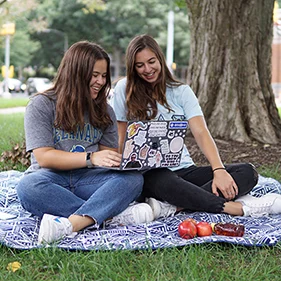Hillel in 2020: A year in three acts

This story was originally published in Cleveland Jewish News.
As philosopher and playwright Mike Tyson once said: “Everyone has a plan until they get punched in the mouth.”
When this year began, and I started as the new president and CEO of Hillel International, we were in the process of putting together a new multi-year strategy to engage, inspire and empower even more Jewish students, strengthen their connections across the global Hillel movement, and secure the resources needed to launch Hillel into its second century. This honeymoon period, of course, came to an abrupt conclusion in March with the onset of the pandemic.
While many people have expressed to me how sorry they are that my tenure has begun during this unprecedented crisis, I’ve focused instead on the incredible opportunity that my colleagues and I have to make a difference in this difficult moment. It may not be the year any of us anticipated, but we know that students need Hillel now more than ever.
Dislocated, isolated and bounced around like human pingpong balls, students are depending on Hillel for the continuity and comfort of a Jewish community, opportunities to learn from Jewish texts and tradition in ways that provide a sense of meaning and purpose, and for pastoral care and support for those suffering from more significant personal or family stress and loss. I’ve been so inspired by our community of Hillel professionals, lay leaders, student leaders and donors, who have thrown themselves into overcoming the intense challenges of this crisis.
In the first weeks of the pandemic, when campuses closed, we pursued a series of rapid steps to ensure all Hillels could continue to actively support students. With the launch of our Hillel@Home digital engagement platform and after provisioning every campus Hillel with Zoom accounts, we hosted more than 20,000 digital programs and events. At a financial level, we came together to secure more than $20 million in resources to retain our key student-facing professionals on campus. And we convened all of our leadership groups – professional, lay, student and funder – throughout the spring and summer to support one another and stay in sync as a movement.
Through all of these steps, we succeeded in actually engaging more students during the last academic year than ever before – more than 140,000 – even with students being remote for more than three months.
Looking back, we realize that while the pandemic halted our formal strategic planning process, it actually accelerated our progress in both assessing current student needs and rapidly innovating in ways that will elevate our work for years to come.
But the story doesn’t end there. Like in a play where the hero ends Act II beset by an even more daunting challenge than the one she had just vanquished, we’re now faced with an even more complex landscape entering the new academic year. Colleges and universities have adopted a dizzying array of approaches for the fall semester, which are changing week by week.
While students initially embraced novel digital programs as a way to stay connected to their Hillel communities, we are now facing “Zoom fatigue,” requiring even further adaptation in how we reach students off campus. And while we enjoyed a brief decline in anti-Semitic incidents and anti-Israel campaigns when students initially left campus, both of these challenging dynamics are ramping back up in this highly politicized moment.
We are taking on these new challenges with a commitment to continue adapting to meet the moment. In lieu of typical events to welcome freshmen, Hillels are launching a new wave of digital programs tuned to overcome Zoom fatigue through shorter length, smaller groups and more interactivity, such as virtual scavenger hunts and escape rooms; distributing Shabbat kits and meals (“Shabags” and “Shaboxes”) so that students can make Shabbat for themselves within their “pods”; and engaging students in person, where circumstances permit, through small-group learning and community cohorts, outside in tents, and through one-on-one experiences all optimized for social distance.
For the first time, Hillels will join together for shared celebration of Rosh Hashanah and Yom Kippur, through our creative “Higher Holidays” experiences, in partnership with Reboot. We’re also providing students with opportunities to engage with critical social issues from a Jewish perspective, through our MitzVote civic engagement and voter registration campaign and a growing array of new racial justice and community service initiatives. And we are educating and training university administrators on how to recognize and aggressively respond to anti-Semitism through our new Campus Climate Initiative, to ensure that Jewish students have safe and supportive environments in which to pursue their educations.
While none of us can predict exactly how the academic year will unfold, I am confident that Hillel will rise to the challenge. No one likes to be punched in the mouth. But it’s how you punch back that really matters.
Adam Lehman is the president and CEO of Hillel International.